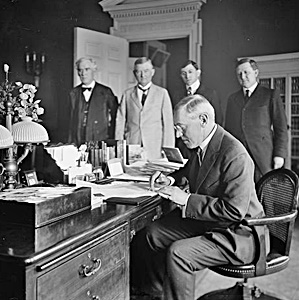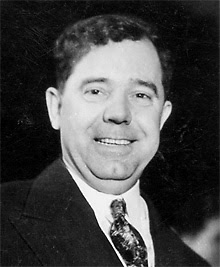“Man is the only animal that deals in that atrocity of atrocities … War. He is the only one that gathers his brethren about him and goes forth in cold blood and calm pulse to exterminate his kind. He is the only animal that for sordid wages will march out and help to slaughter strangers of his own species who have done him no harm and with whom he has no quarrel.”
~Mark Twain

1781 – Major General Nathanael Greene of the Continental Army carried out offensive action against Lieutenant Colonel Alexander Stewart and the British soldiers at Eutaw Springs, located on the banks of the Santee River in South Carolina.
A four-hour inconclusive bloodbath in the burning sun ensued, ending in both sides retreating from the battlefield. More than 500 Americans were killed or wounded in the action. British losses were even greater and the greatest sustained by any army in a single battle during the entire Revolutionary War.

1892 – The original Pledge of Allegiance was published in the September 8 issue of the popular children’s magazine The Youth’s Companion. “The Pledge” – as it was originally known – was written by a former Baptist preacher, Francis Bellamy. It only took Mr. Bellamy three hours to write the original 23 words in honor of the 400th anniversary of Columbus discovering America. The official name of the “Pledge of Allegiance” was formally adopted by Congress in 1942, and the last change in language came on Flag Day 1954 when the words “under God” were added.
As seen in the photo above, American children were asked to perform the pledge using the so-called Bellamy Salute. That didn’t change for forty years. When Adolf Hitler rose to power and Germans began saluting in a similar manner, President Franklin Roosevelt changed the salute to the hand-over-heart method we see today.

1900 – A Category 4 hurricane ripped through Galveston, Texas, killing an estimated 6,000 to 8,000 people. A 15-foot storm surge flooded the city, then situated at less than nine feet above sea level, and numerous homes and buildings were destroyed. The hurricane remains the worst weather-related disaster in U.S. history in terms of loss of life.

1916 – President Woodrow Wilson signed the Emergency Revenue Act, doubling the rate of income tax and adding inheritance and munitions profits tax.
Preparation for and entry into World War I had greatly increased the government’s need for revenue. Congress responded to this need by raising the lowest tax rate from 1 percent to 2 percent; those with incomes above $1.5 million were taxed at 15 percent. The act also imposed new taxes on estates and excess business profits.
By 1917, largely due to the new income tax rate, the annual federal budget was almost equal to the total budget for all the years between 1791 and 1916. Still more was required, however, and in October 1917, Congress passed the War Revenue Act, lowering the number of exemptions and greatly increasing tax rates.
Under the 1917 act, a taxpayer with an income of $40,000 was subject to a 16 percent tax rate, while one who earned $1.5 million faced a rate of 67 percent. While only five percent of the U.S. population was required to pay taxes, U.S. tax revenue increased from $809 million in 1917 to a whopping $3.6 billion the following year. By the time World War I ended in 1918, income tax revenue had funded a full one-third of the cost of the war effort.

1921 – The first Miss America Pageant was held at Atlantic City, New Jersey. This first contest was a promotion to keep tourists in the resort town after the Labor Day holiday. Miss District of Columbia won the contest and received a golden statue of a mermaid as her prize! She was 16-year-old Margaret Gorman, a 5’1″ blonde with blue eyes who weighed 108 pounds.
To be completely accurate, Gorman won two titles, “Inter-City Beauty, Amateur,” and “The Most Beautiful Bathing Girl in America,” both horribly awkward pageant titles. One year later, pageant officials decided to merge her two previous awkward titles into the more succinct “Miss America.”
I know you’re secretly curious so here you go. Her vital statistics were 30-25-32.

1935 – Senator Huey Long was shot in the Louisiana state capitol building. He died about 30 hours later. Called a demagogue by critics, the populist leader was a larger-than-life figure who boasted that he bought legislators “like sacks of potatoes, shuffled them like a deck of cards.” He gave himself the nickname “Kingfish,” saying “I’m a small fish here in Washington. But I’m the Kingfish to the folks down in Louisiana.”
Long, who was strongly considering challenging President Franklin Roosevelt in the next election, was shot by Dr. Carl Weiss at point-blank range outside the main hall of the capitol building. Weiss’ motives continue to be debated, but some believe he was angry about rumors Long had spread about the doctor’s in-laws, who had opposed Long politically.

1941 – German forces began their siege of Leningrad, a major industrial center and the USSR’s second-largest city.
On Adolf Hitler’s express orders, most of the palaces of the Tsars, such as the Catherine Palace, Peterhof Palace, Ropsha, Strelna, Gatchina, and other historic landmarks located outside the city’s defensive perimeter were looted and then destroyed, with many art collections transported to Nazi Germany.
The city ran out of pasta, cereals, grain, flour, sugar and meat within one month. At that point, the only food available to citizens was 125 grams of bread per day, of which 50-60% consisted of sawdust. The siege of Leningrad, which lasted a grueling 872 days, resulted in the deaths of some 1.1 million of the city’s civilians (800,000 starved to death) and over 1 million Red Army defenders.
The siege of Leningrad was the most lethal siege in world history, and some historians speak of it in terms of genocide, as a “racially motivated starvation policy” that became an integral part of the unprecedented German war of extermination against populations of the Soviet Union.

1943 – Gen. Dwight Eisenhower publicly announced the surrender of Italy by Gen. Pietro Badoglio to the Allies. In response Adolf Hitler launched Operation Axis, the occupation of Italy.
As German troops entered Rome, General Badoglio and the royal family fled Rome for southeastern Italy to set up a new antifascist government. Italian troops began surrendering to their former German allies. Those that resisted, as had happened earlier in Greece, were slaughtered. 1,646 Italian soldiers were murdered by Germans on the Greek island of Cephalonia, and the 5,000 that finally surrendered were ultimately shot.

1966 – Alfred Hitchcock’s Psycho, starring Janet Leigh and Anthony Perkins, opened nationwide.
The film was nominated for five Academy Awards. It failed to win any but Hitchcock laughed all the way to the bank. Filmed on a budget of $800,000, Psycho grossed over $50 million at the box office.

1966 – NBC headed into “Space: the Final Frontier” as the first episode of Star Trek was seen on the network. Although Star Trek has become a cult phenomenon, the NBC series did not do well. It was regularly beaten in its time slot, and it placed #52 among all series in 1966-1967 (and that was its best season!). NBC canceled the show on September 2, 1969.

1974 – In a controversial executive action, President Gerald Ford pardoned his disgraced predecessor Richard Nixon for any crimes he may have committed or participated in while in office. Ford later defended this action before the House Judiciary Committee, explaining that he wanted to end the national divisions created by the Watergate scandal.
Indeed, after taking the oath of office on August 9, Ford had spoken to the nation in a television address, declaring, “My fellow Americans, our long national nightmare is over.”

1991 – Actor Brad Davis (Roots, Sybil and Chariots Of Fire but best remembered for his performance in Midnight Express) died (assisted suicide) after a seven-year battle with HIV. He was 41.

1999 – American Beauty had its world premiere at Grauman’s Egyptian Theatre in Los Angeles.
Filmed on a budget of $15 million, American Beauty grossed $360 million at the box office.
The film was nominated for eight Academy Awards, winning five: Best Picture, Best Director (Sam Mendes), Best Actor (Kevin Spacey), Best Original Screenplay (Alan Ball), and Best Cinematography (Conrad Hall).

2003 – Leni Riefenstahl, who directed the Nazi propaganda films Triumph of the Will (1935) and Olympia (1938), died at the age of 101.
The films are widely considered two of the most effective and technically innovative propaganda films ever made.
Riefenstahl said she was fascinated by the Nazis, but also politically naive, remaining ignorant about war crimes. Over the years, she filed and won over fifty libel cases against people who had accused her of complicity with Nazi crimes.
Shortly before she died, Riefenstahl voiced her final words on the subject of her connection to Hitler in a BBC interview: “I was one of millions who thought Hitler had all the answers. We saw only the good things; we didn’t know bad things were to come.”

2017 – Country music singer Don Williams died of emphysema at the age of 78.
He reached the top of the country music singles chart seventeen times in his career. In fact, between 1974 and 1991, of the nearly 50 singles he released, all but three reached the Top Ten.

2021 – The Robert E. Lee Monument on Monument Avenue in Richmond, Virginia, was removed from the site.
On June 4, 2020, Virginia governor Ralph Northam announced that the Richmond statue would be removed in response to the protests that followed the murder of George Floyd in Minneapolis, but the order was blocked by a state court pending the outcome of a lawsuit. The Supreme Court of Virginia ultimately ruled in Northam’s favor

2022 – Queen Elizabeth II died at Balmoral Castle in Scotland after reigning for 70 years, the longest of any British monarch and the longest verified reign of any female head of state in history. Her son Charles, Prince of Wales, ascended the throne upon her death as Charles III.
Compiled by Ray Lemire ©2023 RayLemire.com / Streamingoldies.com All Rights Reserved.
My daily lessons…always interesting and sometimes surprising! The good and the bad, man’s inhumanity to man always astounding
Twain had it right
Thank you, Mary Helen. There are many examples of man’s inhumanity to man every single day, and some of those days make me shake my head in disbelief when I put these columns together. That said, the September 11 column – the longest column I have ever written – is, without a doubt, the most shocking date in history. It is not for the faint of heart.
That column may be the impetus for taking some time off from history columns and getting back to music medleys. I still haven’t made up my mind on that but I certainly am considering it.
TGIF Ray, I like the hand over heart for the Pledge.
Nathanel Green, another Freemason Brother (as was George Washington BTW) but there is disagreement whether Bro. Greene’s connection belonged to a lodge in Rhode Island or a military lodge.
There are many artifacts of his that are in the possession of the Grand Lodge of Rhode Island (his birthplace), including a Masonic Medal he wore during the war that was presented by Lafayette and a Masonic Apron.
https://www.scottishriteboston.net/en/article_view.php?news_id=1227
Not a fan of removing statues affiliated with history, which CANNOT be removed. Initiated by ‘Blackface’ Northam no less.
Thanks, Jr.
The hand over heart pledge gets my vote, too.
Nice link to the life of Nathaniel Greene!
And as for removing statues, I am 110% against it. They are part of our history! Former (thankfully) Gov. Northam was, and still is, an embarrassment.
Wow thanks Ray for all of these memorable events.
Jane
Thank you, Jane, for taking the time to read it.
Thumbs down to Huey Long and Ralph Northan. Destroying historical statues is just plain wrong. The inhumane actions during the siege of Leningrad is astounding, as is so much done by the Nazis. On the brighter side Don Williams was one of the best. Also, on this date in 1937, was the birth of Albert “Buzzy” Conant! (LOL)
Happy Birthday, Buzzy!
As for your other comments, you are once again spot on!